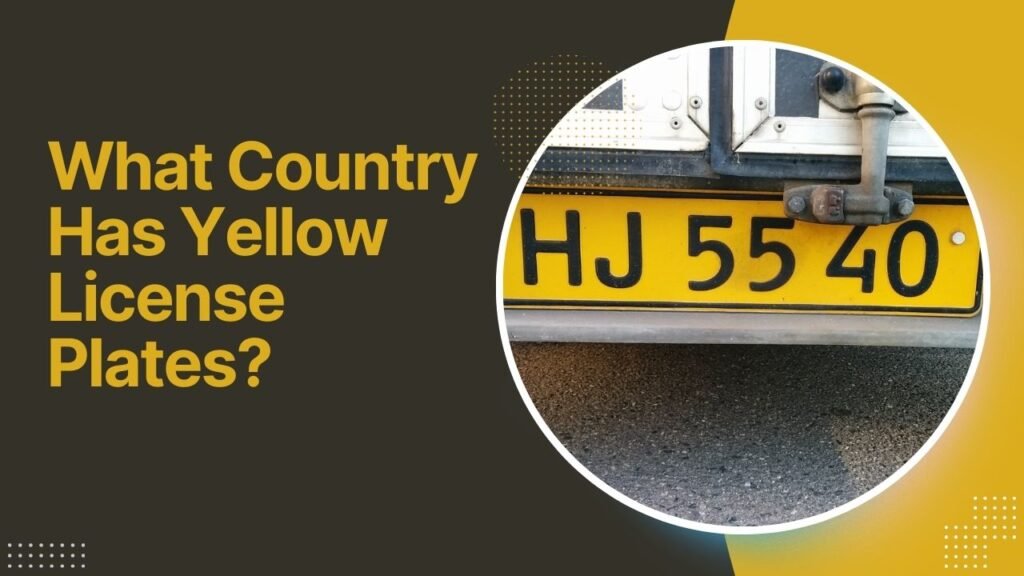Can Cops Scan Your License Plate While Driving? Yes, police can scan license plates while driving using Automatic License Plate Recognition (ALPR) systems.
Automatic License Plate Recognition (ALPR) technology has become a powerful tool in law enforcement, allowing police officers to scan license plates while on patrol and instantly access relevant information.
With its ability to flag vehicles with outstanding issues, ALPR significantly enhances public safety.
However, this advancement also raises important questions about privacy, legality, and data retention, sparking debates about the fine line between public safety and individual privacy rights.
Understanding the implications of ALPR can help citizens stay informed about their rights and how this technology affects them.
Contents
- 1 What is ALPR Technology?
- 2 Legal Framework Around License Plate Scanning
- 3 Reasons Police Scan License Plates
- 4 Can Police Scan Plates Without Suspicion?
- 5 Limitations and Potential Issues with ALPR
- 6 What to Do If Your License Plate is Scanned
- 7 FAQs
- 8 Conclusion: Can Cops Scan Your License Plate While Driving?
What is ALPR Technology?
Definition and Purpose
Automatic License Plate Recognition (ALPR) is a system that uses optical character recognition (OCR) technology to identify vehicle license plates in real-time.
The ALPR system is equipped with cameras, often mounted on police vehicles or at fixed locations, that automatically capture license plate images as vehicles pass by.
The technology instantly processes these images, identifying and converting the alphanumeric characters into data that’s compared with law enforcement databases.
How It Works
ALPR systems work continuously, scanning every license plate that comes into view, whether a vehicle is parked or in motion.
Once a plate is scanned, the system uses software to identify the characters, cross-referencing it against records in seconds. [Can Cops Scan Your License Plate While Driving?]
This real-time information can alert police if a vehicle has been reported stolen, is connected to an outstanding warrant, or is associated with other legal issues.
In many cases, officers do not even need to pull over to initiate the scan, as the system operates automatically, allowing law enforcement to stay on the move while performing these checks.
Growing Use Beyond Law Enforcement
Although originally designed for police use, ALPR technology is now widely used by private companies as well. [Can Cops Scan Your License Plate While Driving?]
Repossession agencies use it to locate vehicles with defaulted payments, parking companies use it to enforce parking regulations, and gated communities employ ALPR to monitor access.
However, these private uses often have more lenient regulations than those imposed on law enforcement, raising additional questions about data usage and privacy.
Legal Framework Around License Plate Scanning
Federal and State Regulations
The legality of ALPR technology varies widely in the United States. While no single federal law regulates its use, some states have implemented their own laws, creating a patchwork of regulations across the country.
For example, California has strict ALPR regulations requiring agencies to publish transparency reports and safeguard collected data, while other states may have minimal guidelines, if any.
These disparities mean that a driver’s experience with ALPR can differ greatly depending on where they are. [Can Cops Scan Your License Plate While Driving?]
Privacy Concerns and Data Retention
A central concern with ALPR is data retention, as the technology collects location and movement data that can reveal sensitive information about individuals.
Privacy advocates worry about the risk of “mission creep” — when data collected for one purpose is repurposed for another, unrelated purpose.
For example, an agency may initially collect data to enforce traffic laws, but later share it with other departments or even private organizations, expanding its usage beyond the original intent.
Some states address this by mandating strict data retention policies, limiting how long information can be stored.
Typically, retention periods range from a few days to several years, depending on the jurisdiction. [Can Cops Scan Your License Plate While Driving?]
Emerging Legal Challenges
The rapid expansion of ALPR has spurred various legal challenges from privacy advocates and civil rights organizations.
They argue that indiscriminate data collection infringes on privacy rights, particularly for individuals with no criminal background.
These challenges have resulted in lawsuits aimed at defining and limiting ALPR use, pushing for legislation that better balances public safety and personal privacy.
While courts generally uphold ALPR as constitutional, the legal landscape continues to evolve with new cases challenging specific aspects of ALPR implementation.
Reasons Police Scan License Plates
Detecting Stolen Vehicles
ALPR is invaluable in quickly identifying stolen vehicles, helping law enforcement recover vehicles and assist victims. [Can Cops Scan Your License Plate While Driving?]
Police cars equipped with ALPR technology can scan hundreds of plates in minutes, making it possible to find stolen vehicles in parking lots or during routine patrols.
In some cities, this has led to a substantial increase in recovery rates, with officers often alerted within seconds of a stolen vehicle’s detection.
Identifying Outstanding Violations
ALPR technology also plays a key role in flagging vehicles with outstanding violations. These may include unpaid parking tickets, expired registrations, or suspended licenses.
For example, if a driver has multiple unpaid parking fines, the ALPR system can detect this and notify officers.
This proactive approach enables police to address minor violations before they escalate, improving overall traffic law compliance.
Criminal Activity Alerts
In addition to scanning for stolen cars and minor violations, police use ALPR to track vehicles related to more serious crimes. [Can Cops Scan Your License Plate While Driving?]
A vehicle’s license plate might be linked to an investigation, such as a hit-and-run or other criminal activity.
By alerting officers when such vehicles are detected, ALPR enables them to take action immediately, sometimes leading to the capture of suspects or the prevention of further crimes.
Traffic Safety Monitoring
ALPR can also be used for monitoring traffic patterns and identifying vehicles involved in traffic violations, such as speeding or reckless driving.
While traffic cameras are commonly used for this purpose, ALPR allows police to scan and detect traffic offenders while on patrol.
This aspect of ALPR’s use extends beyond crime detection to improve road safety and reduce accidents. [Can Cops Scan Your License Plate While Driving?]
Can Police Scan Plates Without Suspicion?
Proactive Policing
One unique feature of ALPR is its ability to scan plates without the need for prior suspicion. Proactive policing allows officers to screen all visible plates, regardless of whether they suspect a vehicle of involvement in criminal activity.
This can enhance efficiency by identifying issues quickly, especially in areas where high-volume traffic would make manual checks impossible.
However, this also raises concerns about blanket surveillance, with critics questioning the necessity and implications of scanning innocent drivers.
Legal Precedents
In various court rulings, judges have generally supported ALPR use, reasoning that license plates are publicly visible, meaning drivers have limited expectations of privacy.
However, legal debates continue to surface over data retention, use limitations, and the potential for misuse. [Can Cops Scan Your License Plate While Driving?]
Some cases challenge the constitutionality of ALPR under the Fourth Amendment, arguing that the data collection constitutes an unreasonable search.
So far, courts have sided with law enforcement, allowing ALPR to continue, but ongoing lawsuits and advocacy could change this in the future.
Limitations and Potential Issues with ALPR
False Positives and Errors
Though ALPR is highly effective, it’s not immune to errors. False positives, where a license plate is incorrectly flagged as stolen or associated with a crime, can lead to unnecessary stops and inconvenience for innocent drivers.
Misreads may occur if the plate is partially obscured or damaged. Law enforcement agencies work to minimize these errors, but they remain a potential downside of relying on automated technology.
Civil Liberties Concerns
ALPR technology has sparked debates among privacy advocates who argue that its widespread use can infringe on civil liberties.
One major concern is that ALPR creates a trail of location data, enabling authorities to track people’s movements over time.
This information could be misused, leading to profiling or unauthorized surveillance. [Can Cops Scan Your License Plate While Driving?]
Some states have responded to these concerns by restricting how and when ALPR data can be accessed and by requiring transparency reports on its usage.
Chilling Effect on Free Movement
A subtler consequence of ALPR may be its impact on people’s freedom of movement. [Can Cops Scan Your License Plate While Driving?]
Knowing that their location could be logged might deter some individuals from visiting certain areas or attending certain events, fearing surveillance or potential profiling.
This effect is particularly concerning in regions with high ALPR usage, where nearly every trip could be tracked. [Can Cops Scan Your License Plate While Driving?]
What to Do If Your License Plate is Scanned
Legal Recourse
In areas with ALPR, individuals concerned about privacy may have the right to seek information on how their data is used.
Some states have laws allowing citizens to inquire about or even challenge the retention of their ALPR data if they believe it infringes on their privacy.
Individuals can consult local or state policies to see if they have grounds for complaints or legal challenges.
Data Inquiry
In select states, people can request access to ALPR data that has been collected on their vehicles.
This transparency allows concerned citizens to view what information law enforcement has gathered on them and, in some cases, request that it be deleted if it serves no legal purpose.
However, these options are not available everywhere, so checking local regulations is important.
See Also: What Is A Yellow German License Plate Used For?
FAQs
Can you avoid having your license plate scanned?
Not easily; ALPR systems are designed to scan all visible plates, often without requiring driver consent.
How long is ALPR data stored by police?
The retention period varies widely, with some jurisdictions keeping data for days and others for years.
Can you request your ALPR data from the police?
In some states, you can inquire about or access your ALPR data, but policies vary. [Can Cops Scan Your License Plate While Driving?]
Is ALPR technology legal in all states?
Yes, ALPR is legal nationwide, but state-level regulations vary significantly, especially regarding data storage and privacy protections.
Are there restrictions on private companies using ALPR?
Yes, but restrictions on private companies are often more lenient, allowing entities like repossession agencies to use ALPR under fewer limitations.
Conclusion: Can Cops Scan Your License Plate While Driving?
Automatic License Plate Recognition technology has changed the landscape of law enforcement, providing a quick and efficient method for monitoring vehicles and addressing public safety concerns.
The technology has undoubtedly improved the speed and accuracy of identifying vehicles linked to legal issues. [Can Cops Scan Your License Plate While Driving?]
However, the widespread use of ALPR raises concerns about privacy, data retention, and the risk of overreach.
As ALPR continues to evolve, a balance between public safety and civil liberties is essential to ensure that this technology serves its intended purpose without compromising individuals’ rights.

I’m Karsyn Marsh, a blogger from a small village in Texas. I enjoy writing about many topics, and right now, I’m focused on license plates. I share helpful information and facts on LicensePlateFacts.com.



